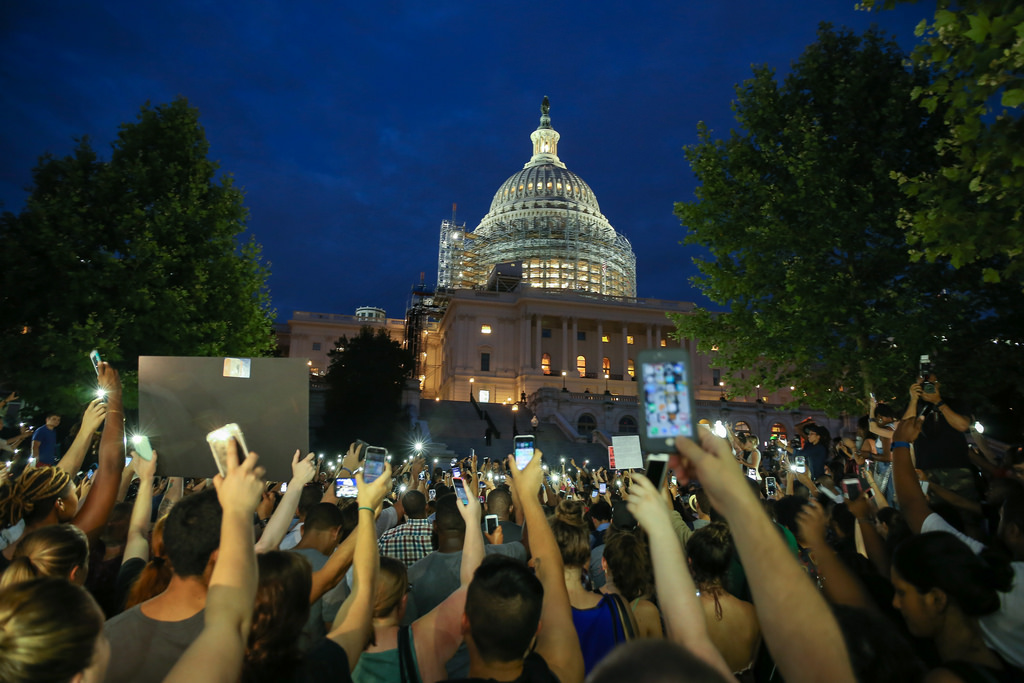 NEWS
NEWS
 NEWS
NEWS
 NEWS
NEWS
Leaders in the blockchain-technology industry trekked to the Democratic National Convention in Philadelphia today to speak with various world leaders and political representatives about the future of blockchains. A blockchain is a global, peer-to-peer distributed ledger that is cryptographically secured by participants used to securely record historical transactions; it is also the technology that provides the infrastructure for Bitcoin, a leading cryptocurrency.
Blockchains have applications for securities trading (such as stocks), providing proof-of-publish for documents (such as notary) and tracking the supply chain lifecycle of manufactured and distributed goods (such as anti-counterfeiting luxury items or even diamonds). A blockchain can also be used by governments to provide authentication and proof-of-publish for ownership documents (for example: land ownership) or even as the basis of a secure electronic voting system.
More than 400 world leaders attended a panel entitled “Who Will Vote: The Emerging Electorate” that included Jamie Smith, Global Chief Communications Officer of The Bitfury Group and co-founder of the Blockchain Trust Accelerator and Dr. Tomicah Tillemann, Director of the Bretton Woods II Initiative at New America and the other co-founder of the Blockchain Trust Accelerator.
“If we embrace this new technology we have the power to potentially completely revolutionized the way we vote, poll, aggregate and analyze data, and process financing through Blockchain technology,” said Smith. “Imagine an election where citizens can vote with their phones from the factory floor, where campaign finance disclosures are immediate and transparent, and where polling data is verifiably accurate, secure and easier than ever to share. This is the election landscape that blockchain technology can provide, and these pilot projects are already underway.”
Governments run on paper trails and blockchains work well for auditing, authenticating and providing security for sets of documents. photo credit: Paper pile – April 2011 – 3 via photopin (license)
Yesterday, co-author of Blockchain Revolution Alex Tapscott gave the opening keynote at the Rock the Vote “Truth to Power” event where he focused on blockchain-technology and how the next President could usher in the next era of the Internet and become the first “blockchain president.”
Blockchain-technology delegates visiting the Democratic National Convention should be no surprise after former U.S. Secretary of State and Democratic U.S. President nominee Hillary Clinton mentioned blockchains in her campaign’s “Initiative on Technology and Innovation” document. The mention, while extremely brief, placed blockchains alongside autonomous vehicles and machine learning, and called upon innovators to look into “public service blockchain applications.”
As mentioned above, blockchains have the potential to be used for numerous governance and regulatory applications, which could easily fall under “public service.” Due to the distributed and trustless nature of effectively-designed blockchains, one could be used to secure votes, secure sensitive documents against forgery, deliver authentication for identity documents, even provide provenance for paper trails that would be difficult to counterfeit.
And, because a blockchain would be born-digital by default, it makes applications that interact with it more accessible through mobile, such as the quote above mentioning workers voting from the factory floor with their phones. While these applications may be some time off when it comes to making secure, functional applications at scale, the proof-of-concept of blockchain voting has already been put to use by other governments (for example: in Denmark and the Utah Republican party).
“To stay competitive and truly realize the economic and security benefits of this technology, the U.S. government should be investing at least $50 million a year in academic and business research on this technology,” Brian Forde, cofounder of the MIT Digital Currency Initiative who also attended the convention, said in an article on Hillary Clinton at TechCrunch. “By supporting the development of public blockchain-based government applications and funding critical research of this promising technology–the next president will have the power to significantly increase trust in government, decrease bureaucracy and protect consumer data based on the feedback from the cryptocurrency community.”
Blockchain technology adoption is already slowly percolating through various industries from financial technology to supply chain (see IBM’s beta product for supply chains) but government applications also have a lot of potential. By putting the thought in the heads of the future electorate as well as current and potential future legislators and Capitol Hill executives is hoped to spur further tests and adoption of this technology in that sector.
THANK YOU